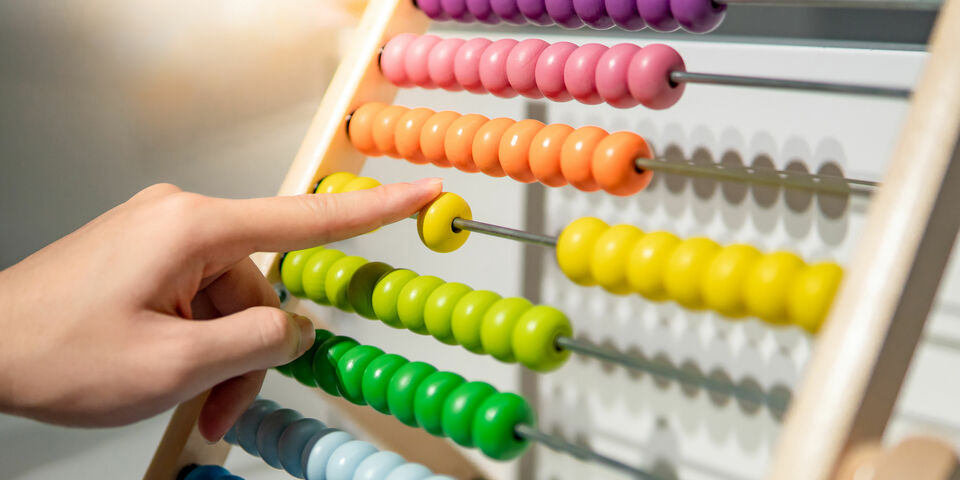Prof Talk | Counting on the future
According to a report by the Education Inspectorate published last week two-thirds of children leaving primary school are not doing their sums as well as they should. The school closures due to the corona lockdowns have done nothing to help their performance. High time to tackle numeracy teaching, says emeritus professor Koeno Gravemeijer. Together with his TU/e colleague Alexander Schüler-Meyer he is arguing for numeracy fit for the future.
A sweater with 40% off hanging on a store rail, baking a bigger cake than the recipe gives, buying the right number of cans of paint for the wall you want to paint, understanding the exponential growth of corona infections. In so many everyday situations, a good grasp of numbers is actually essential. But this is precisely what the majority of primary school leavers are lacking. Math performance in primary education has been the subject of discussion for years, and once again the news from the Education Inspectorate is worrying.
But it is worth taking a look behind the news, believes Koeno Gravemeijer, former professor of Science and Technology Education at the Eindhoven School of Education (ESoE). “In 2010 reference levels were introduced in order to raise math performance. Since then schools have been working with two distinct learning trajectories: the idea was that as many pupils as possible should attain the extension level; the basic level was a lower limit, as it were, that almost all pupils were supposed to attain. Right off the bat the expectation that at least 65 percent of pupils should end up at the extension level caused an outcry. That was much too ambitious, as we now recognize.”
So, aiming to improve math education simply by discovering how pupils perform on average and asking a bit more of them does not work. Some teachers think this basic level is good enough while other schools set their sights on the extension level, which for the majority is beyond their reach. But the fact remains that many primary school pupils are poor at math. What does Gravemeijer think needs to change to improve this situation? “The assumption is that you can learn math by a process of instruction, copy and practice. But that is not the case. Math requires a certain conceptual development. This makes it very different from language. For example, young children do not understand what 4+4 is, but they do grasp that four conkers and another four conkers makes eight conkers. This development process is often ignored. In the short term, direct instruction – the proper name for instruction, copy and practice – works just fine. The pupil sees clearly what is expected, and teachers like it too. But ultimately it leads to passive understanding and the pupil never has any aha moments.”
Teachers would do better, therefore, to focus on the why behind a sum and connect the new and the existing knowledge instead of drilling standard sums, says Alexander Schüler-Meyer, assistant professor of Mathematics Education (ESoE). “Switching to problem-based learning can make math education so much more appealing. Start, for example, with a lesson involving an everyday problem that can be solved with math. Let the pupils themselves set about solving it and afterwards discuss the various possibilities and strategies for solving the problem. This allows pupils to see the relevance of what they are learning and playing with numbers becomes a fun thing to do.”
The importance of asking ourselves what pupils in 2021 really need in terms of numeracy skills is a point both Schüler-Meyer and Gravemeijer make. Gravemeijer: “Instead of competing with computers, we should complement them. Let a device go ahead and do complex calculations for you, as long as you have an understanding of what is happening. To start with, we could lessen the amount of math we do with really large numbers, and instead spend time on learning to model and on estimating. We have an excellent opportunity to overhaul numeracy education right now since pupils have fallen behind in all kinds of ways due to the corona school closures.”
Of course, educational reforms ask more of teaching staff and educational materials, which makes the professional training of teachers so important, says Schüler-Meyer. “So much research has been done in the field of math education in recent decades, there is plenty of scope for improvement. But teachers must have the opportunity to develop the necessary competences. This would also have to be addressed on a larger, national level.” Student teachers are enthusiastic about a new approach, but the innovation this leads to really needs to happen in the schools themselves. Teachers: numeracy can and should be fun!




Discussion